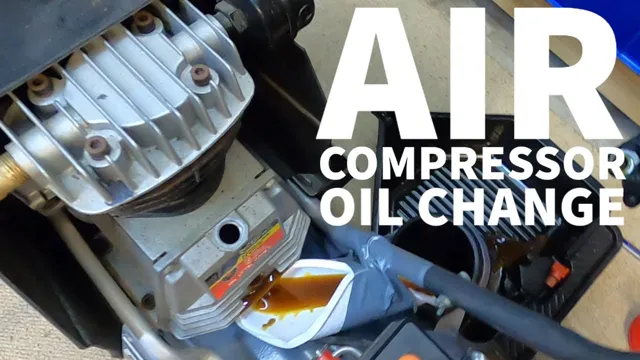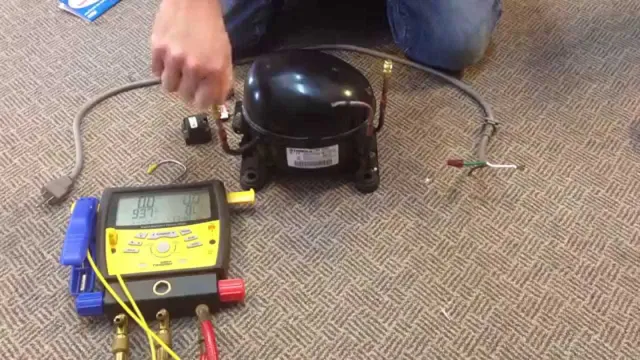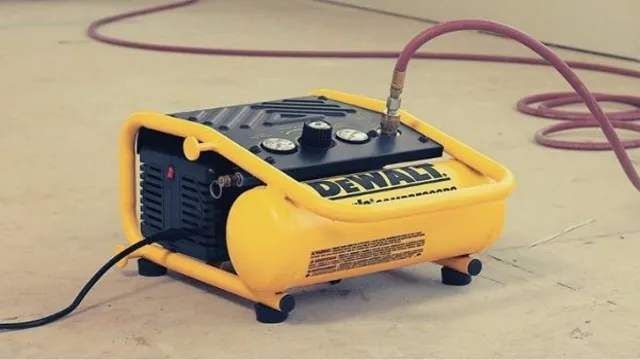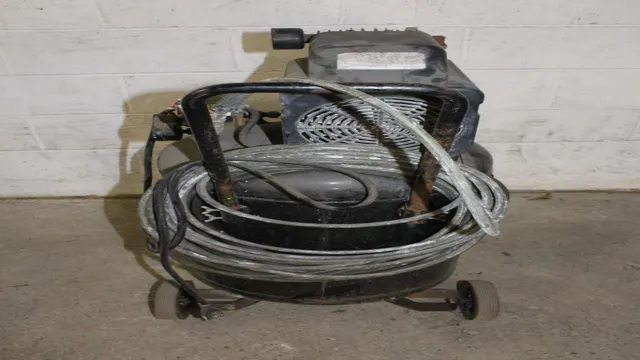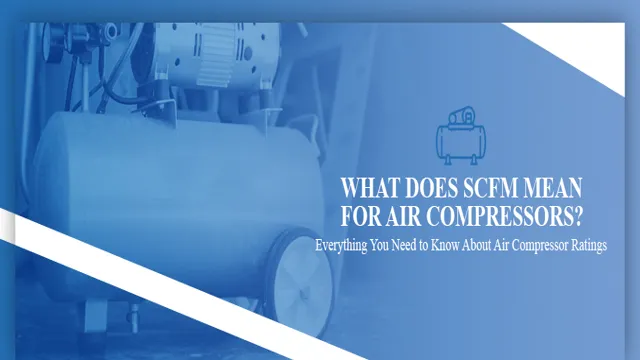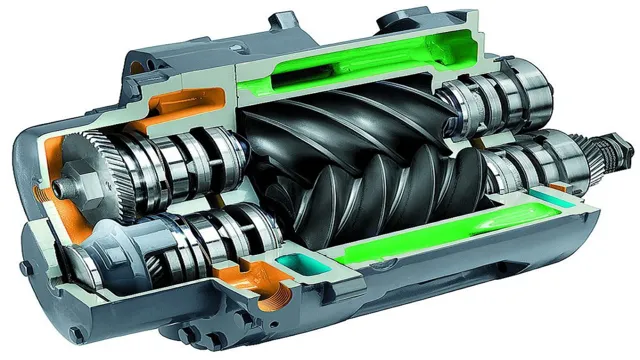How to Prevent Water in Air Compressor: Tips and Tricks for Effective Operation

Do you ever find water in your air compressor? If so, you know how frustrating and damaging it can be. Water in your air compressor can rust your tools, damage your workpiece, and even harm your compressor. Plus, it can be tough to get rid of water once it’s in the system.
But fear not, preventing water in your air compressor is easier than you might think. In this post, we’ll cover some simple steps you can take to keep your air compressor dry and functioning smoothly. So, grab your tool belt, put on your safety glasses, and let’s get to work!
Understanding the Problem
If you’ve ever experienced water in your air compressor, you know how frustrating it can be. The good news is that there are several preventative measures you can take to avoid this issue. Firstly, investing in a high-quality air dryer will go a long way in reducing the amount of moisture in the air.
You should also ensure that your compressor is properly drained of any accumulated water before and after use. Regular maintenance is crucial, including changing filters and checking for leaks in the system. In addition, storing your compressor in a cool, dry area can help prevent moisture build-up.
By taking these steps, you can help prevent water from causing damage to your air compressor and keep it running smoothly and efficiently.
What causes water buildup in air compressors?
Water buildup in air compressors is a common problem that many people often overlook. This issue occurs due to a few different reasons. For one, if the air compressor takes in humid air, condensation can form inside the tank, leading to a buildup of water over time.
Similarly, if there is an air leak in the system, it can allow moisture to enter and settle in the tank. In addition, the size and design of the tank can also contribute to this issue. If the tank is too small or the condensation drains are inadequate, water can accumulate and cause damage to the compressor.
All of these factors can lead to rust, corrosion, and decreased efficiency of the compressor. It’s important to regularly maintain and check your air compressor to ensure it’s working properly and prevent water buildup. This can include draining the tank regularly, fixing any leaks, and using a moisture filter to prevent humid air from entering the system.
By doing these things, you can keep your air compressor in good condition and avoid costly repairs down the line.
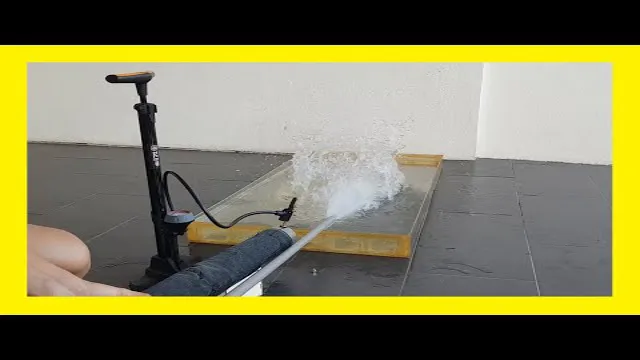
Why is it important to prevent water buildup?
Water buildup may not seem like a significant issue, but it can lead to serious consequences. When water accumulates in one place, it can cause damage to the surrounding area and lead to the growth of mold and mildew. Standing water can also attract insects and pests, increasing the risk of infestations.
Water buildup can also put a strain on drainage systems, leading to their failure over time. This can cause flooding, which can be dangerous and costly to repair. That’s why it’s crucial to prevent water buildup wherever possible.
By keeping gutters clean and ensuring proper drainage, you can reduce the risk of water damage to your home or business. In the long run, investing in preventative measures can save you time, money, and hassle down the line. So, always be mindful of the potential problems that can arise from water buildup and take steps to avoid them.
Solutions for Preventing Water Buildup
If you want to prevent water buildup in your air compressor, there are several handy solutions that you can use. Firstly, you can install a water trap filter in your compressor system. This will help to capture any excess moisture and prevent it from building up.
Another option is to use a dryer that is specifically designed for air compressors. These dryers work by using a desiccant that absorbs any excess moisture in the air. A third solution is to drain your compressor regularly.
You can do this by opening the drain valve and letting any water that has accumulated in the tank to drain out. Alternatively, you could invest in an automatic drain valve that does this for you. Finally, you could also install a refrigerated air dryer.
This system works by cooling the air inside the compressor system, which causes the moisture to condense into droplets that can then be easily removed. By using these solutions, you can ensure that your air compressor stays free from any water buildup, which will help it to function more effectively for longer.
Draining the Air Compressor Regularly
If you want your air compressor to run smoothly and efficiently, it is essential to drain it regularly. Water buildup can cause corrosion and damage, leading to costly repairs and replacements. But don’t worry; there are several solutions for preventing water buildup in your air compressor.
One way is to install an automatic drain valve, which will allow the water to drain automatically without any effort on your part. Another solution is to use a moisture filter, which separates water vapor from the compressed air, ensuring that only dry air goes through your system. Finally, you can manually drain your compressor by following the manufacturer’s instructions.
This involves releasing the water from the tank by opening the drain valve. By taking these measures, you can prevent water buildup and ensure that your air compressor runs optimally for years to come. Remember, maintenance is key to longevity, so take care of your air compressor, and it will take care of you!
Using a Compressed Air Dryer
Using a compressed air dryer can be an efficient solution for preventing water buildup in various applications. When compressed air is used for industrial or commercial purposes, the moisture in the air can cause rust, corrosion, and damage to equipment and machinery. A compressed air dryer works by removing the moisture from the air, ensuring that the air stays dry and free from water buildup.
This can not only prevent damage to equipment, but it can also improve the quality of the end product and increase productivity. There are several types of compressed air dryers, including refrigerated dryers, desiccant dryers, and membrane dryers. Each type has its advantages and disadvantages depending on the specific application.
Choosing the right type of compressed air dryer can help ensure that the system runs efficiently and effectively. Overall, using a compressed air dryer is a cost-effective way to protect equipment and machinery from water damage and ensure optimal performance.
Installing a Water Separator
Installing a water separator is a smart solution for preventing water buildup in your system, and it’s a simple process that you can do yourself. Water buildup in a compressed air system can cause a variety of problems, including corrosion, bacterial growth, and decreased efficiency. By installing a water separator, you can effectively remove unwanted moisture from your system, ensuring that your equipment is protected and operates smoothly.
Essentially, a water separator works by using centrifugal force to separate water droplets from the compressed air. The separated water is then collected and drained away, leaving only dry air to flow through your system. It’s an inexpensive investment that can save you money in the long run by preventing costly equipment damage and downtime.
So, if you’re experiencing water buildup in your compressed air system, consider installing a water separator today.
Maintenance Tips for Preventing Water Buildup
If you’re experiencing water buildup in your air compressor, don’t worry, there are steps you can take to prevent it. Firstly, always remember to drain your tank regularly. Water can accumulate in the tank as you use the compressor, and if it’s not drained, it can lead to rust and reduced performance.
Secondly, make sure you’re using the correct oil for your compressor. The oil you use should be able to handle moisture and high temperatures. Additionally, it’s important to check the air filters regularly.
A dirty filter can cause problems with the compressor, and it can also lead to moisture buildup. Lastly, consider investing in a moisture trap. A moisture trap can help to collect any moisture that may be present in the air before it enters the compressor.
By following these maintenance tips, you can prevent water buildup in your air compressor and keep it running at peak performance.
Inspecting and Replacing Filters
Water buildup in your HVAC system can lead to a range of issues, from unpleasant smells to mold growth and reduced efficiency. One simple maintenance task that can prevent this buildup is regularly inspecting and replacing your filters. Dirty filters can impede airflow and allow moisture to accumulate, so it’s essential to keep them clean and replace them if they’re clogged.
How often you should replace your filters depends on factors like the type of filter you have and your usage patterns, but as a general rule, aim for every 1-3 months. Remember that your HVAC system is working hard year-round to keep you comfortable, so taking a few minutes to regularly maintain it can yield big benefits in the long run.
Keeping the Compressor Cool and Clean
If you want to keep your compressor cool and running efficiently, one thing you need to do is prevent water buildup inside the unit. Water can create rust and corrosion, which can shorten the lifespan of your compressor. One maintenance tip for preventing water buildup is to drain your tank regularly.
If your compressor has an automatic drainage valve, this is as easy as setting it to open at certain intervals. If not, you may need to manually release the water from the tank every few weeks. Another tip is to make sure your compressor has good ventilation.
This will help prevent condensation from building up inside the unit. And finally, consider using a water separator to trap any moisture before it enters the compressor. By taking these simple steps, you can help ensure that your compressor stays cool and clean, and you can maximize its lifespan.
Conclusion
In conclusion, preventing water in your air compressor is essential for maintaining its efficiency and longevity. By regularly draining your tank and investing in a quality moisture filter, you can keep your compressor running smoothly and avoid the costly repairs that come with neglect. Remember, keeping water out of your compressor is like keeping the doctor away – a little prevention goes a long way!”
FAQs
What causes water in an air compressor?
Water in an air compressor is caused by moisture condensing from the air as it enters the compressor.
How can I prevent water from building up in my air compressor tank?
To prevent water buildup in your air compressor tank, you can install a water trap and drain valve to remove any moisture from the air before it enters the tank.
How often should I drain the water from my air compressor tank?
It is recommended to drain the water from your air compressor tank after every use to prevent rust and corrosion.
Can I use a water filter to prevent water buildup in my air compressor tank?
Yes, a water filter can be installed to remove any moisture from the air before it enters the compressor tank, preventing water buildup.
What type of oil should I use in my air compressor to prevent water buildup?
Synthetic compressor oil is recommended to prevent water buildup in your air compressor as it is less likely to emulsify with water.
Does the temperature of the air affect water buildup in my compressor tank?
Yes, cooler temperatures can cause more condensation to form in your air compressor tank, leading to increased water buildup.
How can I properly store my air compressor to prevent water buildup?
To store your air compressor and prevent water buildup, drain all moisture from the tank before storing and store in a dry, cool place.

